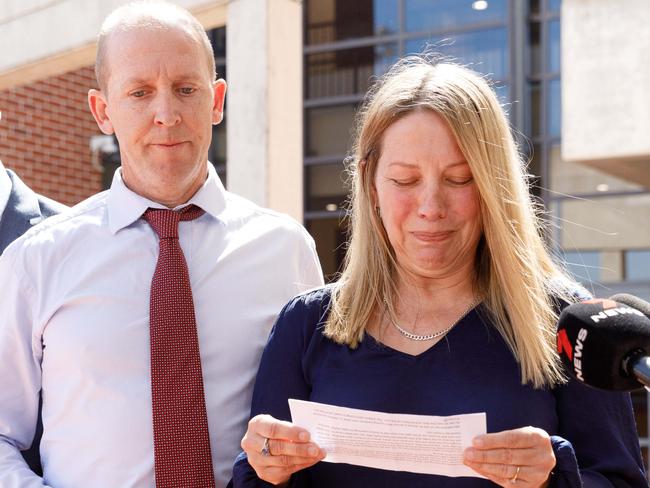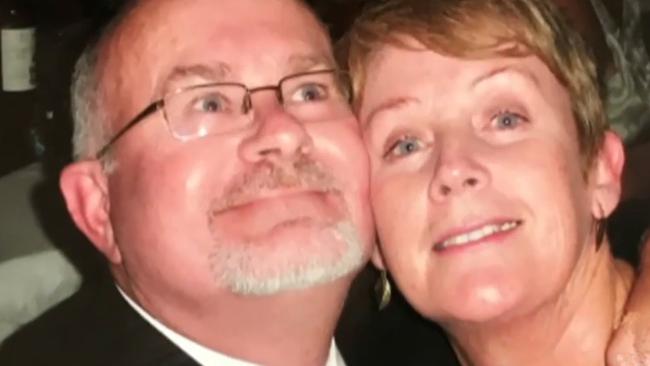Cameron Millen’s family lead call for minimum jail sentences for killer drivers
The shattered families of innocent people killed on the roadsare calling for the introduction of minimum non-parole periods for killer drivers.
Police & Courts
Don't miss out on the headlines from Police & Courts. Followed categories will be added to My News.
The shattered family of a boy hit and killed by a school bus driver thought it was a cruel joke when a magistrate sentenced the offender to a minimum of 12 months in jail.
The parents of 14-year-old Cameron Millen have spoken about the trauma of losing their son, as they plead for judges to dish out harsher non-parole periods to deter dangerous drivers from doing the wrong thing.
Michelle and Geoff Millen and two other NSW families are calling for the introduction of minimum non-parole periods for drivers who kill innocent people on the roads.
While several charges in NSW carry a standard non-parole period, dangerous driving occasioning death doesn’t, and they want that to change.
Cameron, who was in year 9 at Macarthur Anglican School in Cobbitty, was standing on a grassed area with his brother and a group of classmates at the end of the day in February 2023, when the bus Penina Lopesi was driving left the road, mounted the kerb on to the grass and fatally hit him.

At the time of the crash, Lopesi had a shocking driving record, with almost a dozen traffic infringements, including using a mobile phone while driving, running red lights and doing illegal U-turns.
She was involved in a separate bus crash where she ran into a tree.

A court heard Lopesi’s manner of driving when she killed Cameron showed she had “completely abandoned all responsibility” as a road user.
Yet she was sentenced to a non-parole period of just 12 months in jail, which has appalled Cameron’s parents.
“We weren’t prepared (for a sentence so low), not at all. We thought it was a joke,” Mr Millen said.
Ms Millen said: “It’s completely destroyed our family, we are shattered.
“We don’t live in the same world we did two years ago.”

Despite a maximum 10-year sentence being available for drivers who kill another person, it’s rarely used by judges.
In 2023, statistics show most drivers found guilty of such offences escaped with a community-based sentence.
“There is a maximum sentence but it is never utilised. When you hear a maximum sentence of 10 years, you take comfort that the law recognises the seriousness of this crime,” Ms Millen said.
“So how on earth do you get from a 10 year maximum sentence to 12 months custody in the circumstances Cameron was killed?
“The maximum sentence is a myth. It just adds to the trauma of what you expect, versus what you get.”

The Director of Public Prosecutions (DPP) is set to appeal against the sentence, confirming it viewed the penalty as “manifestly inadequate”.
“There needs to be a mandatory sentencing for dangerous driving occasioning death,” Mr Millen said.
“If you’re responsible for someone’s death you (should) automatically know you’re doing two years in jail and it goes up from there depending on the circumstances involved
Ms Millen said during the 18 months between Lopes being charged and her sentencing, Cameron’s family was constantly warned there may be no jail sentence at all.
“We were left on tenterhooks, trying to prepare ourselves for all possible outcomes,” she said.
“Navigating this, while trying to deal with the fact that someone had come into Cameron’s school and killed him, is overwhelming.
“Cam was the baby of our little family of four and we all took extra special care of him.
“He was the nucleus of our family and life without him is lonely, quiet and incredibly painful”.

The Millens’ calls have been backed by Nigel Smith and Mick Duke, who also lost loved ones to dangerous drivers.
Mr Smith’s 18-year-old son Lachlan was killed when his mate sped about 45km/h over the speed limit before striking another vehicle.
The 17-year-old driver, who can’t be named for legal reasons, was sentenced to just two years and three months non-parole.
But after just 10 months in prison, their son’s killer has been granted day release — a decision that “felt like a stab in the heart”.
A week later another email came: he’d been considered for overnight release.
“Our son has been killed and we will never, ever get to see him again and this kid gets release,” Mr Smith said. “It makes the system look like a joke.”
Mr Smith said while his family was “floored” by the decision to grant his son’s killer release so early, he also worried about the message it sent to other young drivers.
“The road toll is going up, it’s worse than last year,” he said.
“There’s no deterrent effect if you can walk out of jail for the day after less than a year, it
makes no difference to any of these kids who want to drive like an idiot.”

Mick Duke’s beloved wife Jo was killed in 2019, when Troy Xerri lost control of his Toyota HiLux ute while speeding, crossed on to the wrong side of the road and crashed into Mrs Duke’s Mazda hatchback.
After two years and four months in prison, he was released on parole.
“I’m still disgusted by it,” Mr Duke said.
“We need a standard non-parole period, something to send the message that you can’t do this.
“You can’t get behind the wheel and act like an idiot. But these sentences show that you can, you’ve only gotta do a short stint in jail.”
The NSW Sentencing Council held a review into whether dangerous driving occasioning death should be added to the standard minimum non-parole scheme in 2011, but ultimately decided doing so was inappropriate.
“Offending varies widely and sentencing for such an offence involves an element of judgment – especially having regard to the fact that it is usually committed by persons of otherwise good character, thus requiring a wide discretion in sentencing,” the council found.
But the NSW Law Reform Commission is undertaking a review of serious road crime offences, and NSW Attorney-General Michael Daley confirmed the government “will carefully consider” any recommendations arising from this review.
“Serious road crime causes untold misery and suffering for those involved – the victims as well as their families and friends. It also can have a terrible and lasting impact on communities,” Mr Daley said.
“The NSW government is committed to ensuring our laws are fit for purpose.”
Do you have a story for The Daily Telegraph? Message 0481 056 618 or email tips@dailytelegraph.com.au





